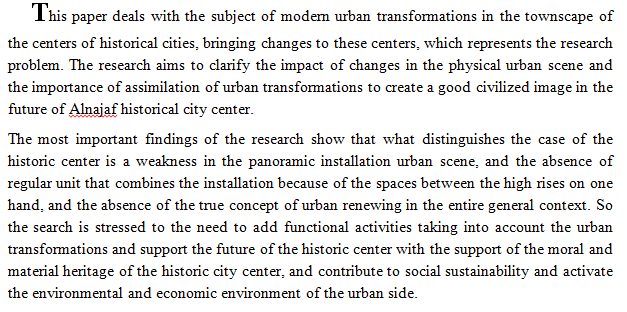
This intervention study is composed on 55 patients at Saddam Center for Cardiac Surgery (Aben-Albetar) throughout the period from 1st of July 1997 to 15th of January 1999. The study aimed to evaluate the effectiveness of constructed nursing education program on reduction of complications and improving recovery among patients with Coronary Artery Bypass Graft (CABG) surgery through the application of repeated measures. The sample is divided into 27 patients who received the nursing educational program (study group) and 28 patients who continued to receive regular care (controls). Based on previous research meth
Background: Hypothyroidism is a clinical syndrome prevalent in women, even those of reproductive age. Ovarian reserve can be defined as the number and quality of follicles in the ovary at any given time. Evaluation of ovarian reserve is recommended for patients at risk of decreased ovarian reserve. Objective: This study aims to evaluate the effect of hypothyroidism on ovarian reserve in Iraqi women by hormonal measurements of serum anti-mullerian hormones AMH, FSH, and LH. Subjects and methods: This case–control study was carried out at the Department of Biochemistry, College of Medicine, University of Baghdad, in collaboration with Endocrinology and Diabetes Clinic, Baghdad Teaching Hospital, and National Center for Teaching Labo
... Show More (1)
(1)
 (2)
(2)
There have been many advances in the solar chimney power plant since 1930 and the first pilot work was built in Spain (Manzanares) that produced 50 KW. The solar chimney power plant is considered of a clean power generation that needs to be investigated to enhance the performance by studying the effect of changing the area of passage of air to enhance the velocity towards the chimney to maximize design velocity. In this experimental and numerical study, the reduction area of solar collector was investigated. The reduction area that mean changing the height of glass cover from the absorbing plate (h1=3.8cm, h2=2.6cm and h3=1.28cm). The numerical study was performed using ANSYS Fluent software package (version 14.0) to solve go
... Show More (4)
(4)
Abstract
The study aims to find out the impact of expectations and perceptions in determining the position of the customer service quality received by him. Represent the expectations and perceptions customer’s key of service quality determinants. The customer's requirements and needs main pivot, who must be built all events and activities and efforts of service organizations, including the hotel and organizations that operate in an environment known as highly competitive , intensification and complexity of the conditions set by the customer and increasing day after day. The study sample of three Luxury hotels in Kurdistan region of Iraq a model. The use of service quality m
... Show MoreA new copolymer (MFA) was prepared from condensation of melamine (M) with p- methyl – anisole (A) in the presence of condensation agent like 37% (w/v) of formaldehyde. The new copolymer was characterized by elemental, IR and HNMR spectra. The chelating ion-exchange property of this polymer was studied for methylene blue dye in aqueous solution in 100-200ppm concentrations. The adsorption study was carried out over a wide range of pH, shaking time and in media of various kinetic parameters models. Thermal parameters like enthalpy, entropy and Gibbs free energy of adsorption process of methylene blue on surface of MFA resin were determined on the basis of kinetic parameters at different temperatures. To describe the equilibrium of adsorp
... Show MoreThis work involves synthesis and characterization of some new 1, 3, 4-thiadiazole or pyrazoline derivatives heterocyclic containing indole ring. The new 2-amino-1, 3, 4-thiadiazole derivatives [IV] and [V] a, b were synthesized by cyclization reaction of 2-methyl-1H-indole-carbothiosemicarbazide [III] in H2SO4 acid or by reaction of indole-3-acetic acid or indole-3-butanoic acid with thiosemicarbazide in the presence of phosphorous oxychloride, respectively. Amide derivatives [VI]-[VIII] were synthesized by the reaction equimolar of 2-amino-1, 3, 4-thiadiazoles and (acetyl chloride, benzoyl chloride, anisoyl chloride and heptanoyl chloride) in DMF and pyridine as accepter. The new pyrazolone derivatives [XI] a, b were synthesized from heati
... Show MoreBackground: Many materials were proposed as root canal obturating materials but the biocompatibility issue remains to be a critical one. Propolis has been used as a therapeutic agent since the time of Hippocrates. It is known that propolis exhibits some pharmacological activities, such as antibacterial, antiviral, antifungal and anti inflammatory activity. Materials and methods: Eighteen albino rats were used in the study and divided randomly into three groups of 6 animals for each group. Each group was scheduled to be sacrificed at different time periods, which were three days, one week and three weeks. Propolis and ZOE sealer implants of 4mm in diameter and 0.5 gm in weight were implanted in the dorsal side of the rats. At the end of the
... Show MoreA new derivatives of Schiff bases connected with 5H-thiazolo[3,4-b][1,3,4]thiadiazole ring 5a-c were prepared via many reactions starting by treating 1,4-phenylene diamine 1 with chloroacetylchloride to prepared compound 2, then reaction with p-hydroxybenzaldehyde to synthesize compound 3 then, this was reacted with thioglycolic acid and thiosemicarazide to giveN,N-(1.4-phenylene)bis(2-(4-(2-amino-5Hthiazolo[4,3-b][1,3,4]thiadiazol-5-yl)phenoxy)acetamide) 4. Compound 4 was treated with different aromatic aldehydes to give a new derivatives of Schiff bases containing 5H-thiazolo[3,4-b][1,3,4]thiadiazole ring 5a-c. The synthesized compounds were characterized using FTIR spectrophotometer and 1H NMR spectroscopy and the biological activity of
... Show More (2)
(2)
 (2)
(2)
 (2)
(2)
